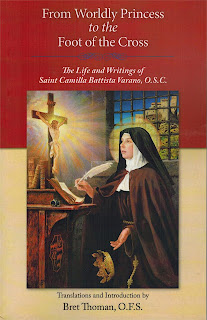Sunday October 17 2010, Pope Benedict XVI elevated to sainthood
Camilla Battista of Varano, OSC, in a ceremony at St. Peter’s Square at
the Vatican.
Biographical Profile Blessed BATTISTA CAMILLA wasborn in Camerino, Italy, on April 9, 1458,
of
Prince JuliusCaesar da Varano and Lady Cecchina di Maestro Giacomo.
Although she was born out of wedlock, nonetheless, Camilla was reared
in the palace of her father. There she received a suitable instruction
in the arts and literature under the tutelage of Giovanna Malatesta, the
wife of the Prince.
Around the agesof 8-10, after having heard the exhortation of the
preacher Fr. Domenico da Leonessa, she made a vow to meditate every
Friday on the Passion of Christ and to shed at least one tear. This
simple endeavor, which she embraced with childlike enthusiasm and
faithfulness even if it cost sacrifices, opened before her the
unfathomable treasures of grace, enabling her to lead an intense
spiritual life. About this resolution she wrote, “
That holy word,
which I uttered, moved by the Holy Spirit, made such an impression on
my tender and childlike heart that it never left my mind and heart.” Yearslater, another Franciscan, Fr. Pacifico of Urbino, encouraged Camilla to persevere in her vow.
Then from the agesof 18-21, she went through three yearsof deep
spiritual struggles against the allurements of the world. Yet, she would
not abandon her suffering Lord; on the contrary, for the sake of his
love she began to lead a more austere way of life. Referring to
thisperiod of her life, she wrote, in fact, “
Blessed is that creature who never gives up under any temptation the good she began!”
During Lent of 1479 on the vigil of the Annunciation in the Church of
St. Peter in Muralto, Camilla listened to the preaching of Br.
Francesco da Urbino. While doing so, she received the light to
understand the inestimable gift of consecrated virginity. So, on the
Octave of Easter, after having made a general confession to Fr. Oliviero
da Urbino, she obtained the gift of a total inner purification.
Having thus prepared herself to belong to Christ totally and having
overcome parental resistance for two years, she managed to enter the
monastery of the Poor Clares of Urbino on Nov. 14, 1481, taking upon the
religiousname of Sr. Battista—a common name for a woman of the time.
She returned to Camerino on the first week of January of 1484 with eight
other of her companions; and on Jan. 4, she gave start to a new
community of Poor Clares in a monastery which her father had purchased
from the Olivetan monks.

She was endowed with extraordinary gifts—as her autobiography
attests—such as interior illumination, fiery words, ecstasy, and visions
of angels and saints. She was even granted her heart’s deepest desire,
namely, to share in the interior pains which our Redeemer endured during
his Sacred Passion. By daily meditation on Sacred Scripture and the
Liturgy and by living constantly in the presence of God—as attested by
her Olivetan Spiritual Director, Antonio of Segovia—Bl. Camilla wasable
through the years to commit to writing textsof mystical literature. The
quality of its spirituality was so high as to be appreciated by renowned
Churchmen and saints, including St. Philip Neri. By the time she turned
35 years of age, she was elected Abbess for the first time, a position
she continued to hold for several terms.
The time had come for the Blessed to face trials. The first one was
spiritual dryness, which lasted for a period of 5 years from 1488 to
1493. During that time, she experienced the silence of Him who was the
only reason for her life. The eco of this spiritual desolation is well
documented in the autobiographical letter known as“
the Spiritual Life”.
The second trial wounded her deeply in the heart, when Pope Alexander
VI excommunicated her father for having resisted the limits set on the
Lordship of Camerino. He was then imprisoned along with her three
brothersby Cesare Borgia, who later had them slain on Oct. 9, 1502.
Because of this tragic incident, Camilla had to flee to the city of
Fermo, where she sought refuge to no avail. She was able, nonetheless,
to seek asylum in the Kingdom of Naples thanks to Isabella Piccolomini
Todeschini, the wife of Matthew Acquaviva of Aragona. It wasnot until
the death of Pope Alexander VI on Aug. 8, 1503, that she was able to
return to Camerino, where her youngest brother, Giovanni Maria, was able
to restore the Lordship of the Varano family.
Then, on Jan. 28, 1505, Pope JuliusII, who admired Camilla, sent her
to found a new community of Poor Claresin the city of Fermo, where she
stayed for two years. She was also able to form the new community of
Poor Claresof Saint Severino Marchesduring the years of 1521-22. Her
spirit of charity enabled her to serve her sisters in many ways in their
spiritual formation; by writing a treatise requested by a religious
entitled, “
The Purity of the Heart”; by interceding for those on death rows; and by saving the city of Treia from mercenary troops.
According to the witness of one of the sisters, there was place in
Camilla’s heart for the whole Church of Christ, for whom she prayed and
suffered. She suffered for the sins of many clergymen, and her heart was
acutely pained over the news reaching her from Germany, where an
Augustinian monk, Martin Luther, was fighting to sever ties with the
Roman Catholic Church.
When she had reached the age of 66, of which 43 were spent in the intimacy of the cloister life, her yearning “
to leave the prison of her body in order to be with Christ”
was satisfied. She died in silence on May 31, 1524, due to a plague
that broke out in the Monastery of Camerino, where her mortal remains
can be found to this day.







